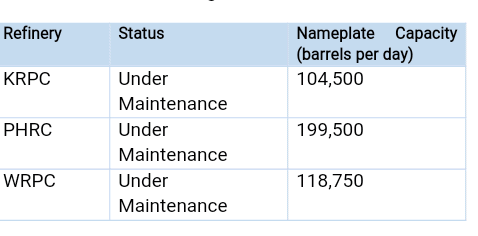Nigeria’s oil refining capacity utilization in 2019 declined a whopping 12.5% below their 2018 levels. The country’s petroleum refining margin has been volatile and it is difficult to reach a consensus on its profitability and ability to maximize long-term value.
Typically, higher oil prices push revenue upward as refineries pass along costs to fuel distributors. However, the consistent decline in Nigeria’s oil production has minimized refinery profitability. For instance, a 2019 review of the extractive industry by the Central Bank of Nigeria (CBN) suggests low capacity utilization of Nigeria’s three refineries, indicating decreased oil production, with little room for profitability. On average, the percentage of capacity utilization of the Warri Refining and Petrochemical Company (WRPC), Kaduna Refining and Petrochemical Company (KRPC), Port Harcourt Refining Company (PHRC), and was estimated at 13.3, 1.1, and 7.2 respectively.
Nigeria’s three refineries incurred ₦50.2bn in gross losses, but spent about ₦98.3bn in administrative/operating expenses, the 2019 report published by NNPC shows. In June of the same year, the NNPC blamed the shortfall in oil production on “…ongoing revamping of the refineries which is expected to further enhance capacity utilization once completed.”
So what’s the problem?
Despite a 445,000 BPD combined capacity to refine crude oil, Nigeria still imports over 90% of its local oil consumption demands. In fact, between 2015 and 2020, Nigeria’s oil refineries operated at an average capacity utilization of 7.87%.
In the wake of weak refining capacities of the three refineries, the Nigerian National Petroleum Corporation (NNPC) said the problem was “attributable to the ongoing revamping of the refineries are expected to further enhance capacity utilization once completed.”
One major reason for the abysmal performance of the refineries is operational failures. For instance, “operational expenses amounted to ₦10.27bn, resulting in an operating deficit of ₦10.23bn by the refineries,” according to NNPC’s report.
According to reports by the corporation, “In June 2020, Port Harcourt, Warri, and Kaduna refineries processed no crude and combined yield efficiency is 0.00% owing largely to ongoing rehabilitation works at the refineries.
For a country with a population of over 200 million people, a daily petrol supply need of 51.6 million litres, and a heavy dependence on oil revenue, this is a big cause of concern.
Table 1. Refineries in Nigeria

Source: Oil & Gas Journal Worldwide Refinery Survey, January 2020
2021: End of the bad times?
With 125,000, 210,000, and 110,000 barrels per day production capacity for WRPC, PHRC, and KRPC respectively, the refineries have been a bright spot for the NNPC. However, in 2019, the refineries continued their losing streak of N167bn and only WRPC processed any oil. In April 2020, all three refineries shut pending rehabilitation to have them at 90% of capacity by 2023.
Is the pain of rehabilitating comatose oil refineries a window into the future for Nigeria’s oil and gas industry? For decades, the NNPC has unsuccessfully attempted to revamp the oil refineries. Last year, in December, NNPC’s Managing Director, Mele Kyari, said the corporation had opened a bid round for a contract to rehabilitate the Port Harcourt refinery. Kyari also said that private companies would run the refineries once they were rehabilitated.
In March 2021, the Federal Executive Council (FEC) approved $1.5 billion for the immediate rehabilitation of the Port Harcourt refinery.
According to the Minister of State for Petroleum Resources, Timipre Sylva, the rehabilitation, which was awarded to an Italian company, Tecnimont SPA, will be done in 3 phases of 18, 24, and 44 months.
What does this tell us about the future?
Many industry analysts expect Nigeria’s crude oil production to be broadly flat in coming years due to concerns among investors about the capacity of the refineries. Low (or no) production of Nigeria’s crude oil means that bottlenecks will appear to threaten future Nigerian oil demand and consequently, profitability.
A shrinking domestic market also portends growing competition from oil refineries in other countries. New sophisticated refineries with significant upgrading capacity continue to open in major oil-producing countries. The bad news has an impact.
While global crude oil prices and refined petroleum products are expected to increase and bolster revenue growth, revenue from Nigeria’s oil refineries continues to fall as the capacity of existing facilities has not upgraded to handle higher production volumes. The steep drop in production annually means that Nigeria’s refineries are in dire need of rehabilitation, reduced processing costs, or temporary halts to operations to save money spent on administrative expenses and improve profitability.
This story was produced under the NAREP Oil and Gas Media Fellowship of the Premium Times Centre for Investigative Journalism.






